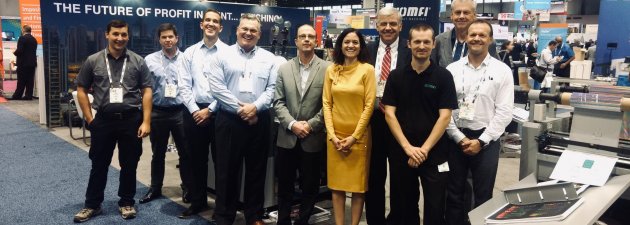With the return of market economy after 1989, there was suddenly a lot of room for the entrepreneurial spirit and technical skill of Czech engineers. Along with that, a fundamental transformation of economic thinking was taking place, with customers now being an important factor in companies’ decisions on their product range. Family businesses were mushrooming, but only those with a clear vision and their own final products and development base were competing successfully with foreign companies newly entering the Czech market.
The Lanškroun-based company Komfi, manufacturer of single-purpose and printing machines, is a good example of such a business. Komfi is celebrating its thirtieth anniversary this year, as the former chief engineer of Lanškroun Tesla Karel Matějček founded a small design office in the early 1990s. Over time, it developed into a worldwide-exporting technology company. Back in the day, with Tesla Lanškroun as a leading manufacturer of radio communication and security electrical equipment still around, there were many capable technicians in the region.
"We were lucky to start cooperating with our former colleagues, who were already experienced professionals and also started their own businesses back then. We knew everyone’s skills and strengths, and needed no written agreements to help each other out," Mr. Matějček recalls. Indeed, the first large deliveries of single-purpose machines were still designed and manufactured in cooperation with partner companies at that time.
Leadership as part of DNA
Komfi saw a turning point in 1994, when Karel Matějček decided to start building machines in his own manufacturing plant in Svébohov near Zábřeh. In the following year, the company won a big contract to build and manufacture a single-purpose machine - an automated assembly line for the inspection and packaging of electronic components. Since then, Komfi has delivered over five hundred pieces of smaller serial-produced packaging machines for electronic components.
The company was getting great reviews and testimonials, which brought about new opportunities. Together with the large US company GBC, Komfi designed the first Orbit laminator, the predecessor of the iconic Delta. The machine was being delivered to the US and Western European markets by the American partner with the Komfi logo until around 2008. After a few years, however, the Americans wanted to transfer the production to China. This was unacceptable to the management of Komfi, who then decided to emancipate, despite the potential risks.
“Our company’s product range has always been diversified. Besides the strategically key segment of single-purpose machines for various industries, we also supply laminators. We have won our customers’ trust with our quality and innovation as well as reliable services. We have retained our customers even in difficult times such as nowadays, when we’ve had to raise prices," says Jana Slováková, daughter of the founder, CEO and marketing and sales director of Komfi.
In thirty years, Komfi has become a respected brand in the global printing community and a leader in modern trends and innovation. The company is ready to invest more in automation, digitisation and artificial intelligence.
"There has long been a clear trend in our industry of maximum automation and digitisation of all processes with the help of AI. Any company which exports a lot to developed markets must respond to this trend," Jana Slováková emphasises.
US is the world leader in printing
The US market currently makes up about 40 percent of Komfi's exports. The company supplies its machines mainly to big players in the printing industry who have high demands for innovation and quality. Jana Slováková says that American customers mainly expect high order processing speed, zero error rate, easy operation even for unqualified operators and compatibility with equipment from other manufacturers.
As a result of digitisation, production has moved from small to large printing companies that can handle the complete job in record time. "Our customers' production portfolio has also changed. In the past, printing companies did not accept orders for less than 600 pieces, while today, they regularly print and laminate individual products. Within three hours, the finished goods is shipped to the customer. Komfi has cooperated with the dealer company Nobelus, its long-standing US partner, on bespoke development projects. Customers also expect high-quality servicing from us, which involves having enough spare parts in stock as well as emergency packages with critical components for instant replacement.
Global supply chain disruption is changing the business
What does the end of globalisation mean for Czech companies and how has it changed their export strategy? "For Komfi, these changes in world trade have strengthened our position in the US market, cemented our positions in Western Europe, particularly in Germany and France. At the same time, we have become weaker in Eastern European markets, but these haven’t been our focus anyway, given both the sophistication and higher pricing of our machines. It may come as a bit of a surprise that we managed to sell two of our machines in Ukraine recently. We even helped the customer install one of the machines via online conferencing.”
Although there was an unexpected drop in the US economy in the first quarter of 2022 (by 1.4% quarter-on-quarter), analysts don’t see a reason to fear recession. Despite the covid pandemic, Komfi also retained a good position in the US market. "We have had to raise our prices a bit recently, but the interest of American customers in our laminators is still growing. They don't worry about higher prices because we meet their demands for automation and digitisation as well as speed of delivery. The dollar exchange rate is also helping at the moment," Jana Slováková assesses. "We see potential complications with the supply of components, but we have stocked up on components for two years ahead," the CEO concludes.
Written by Věra Vortelová
Photo credits: Komfi


 USA
USA